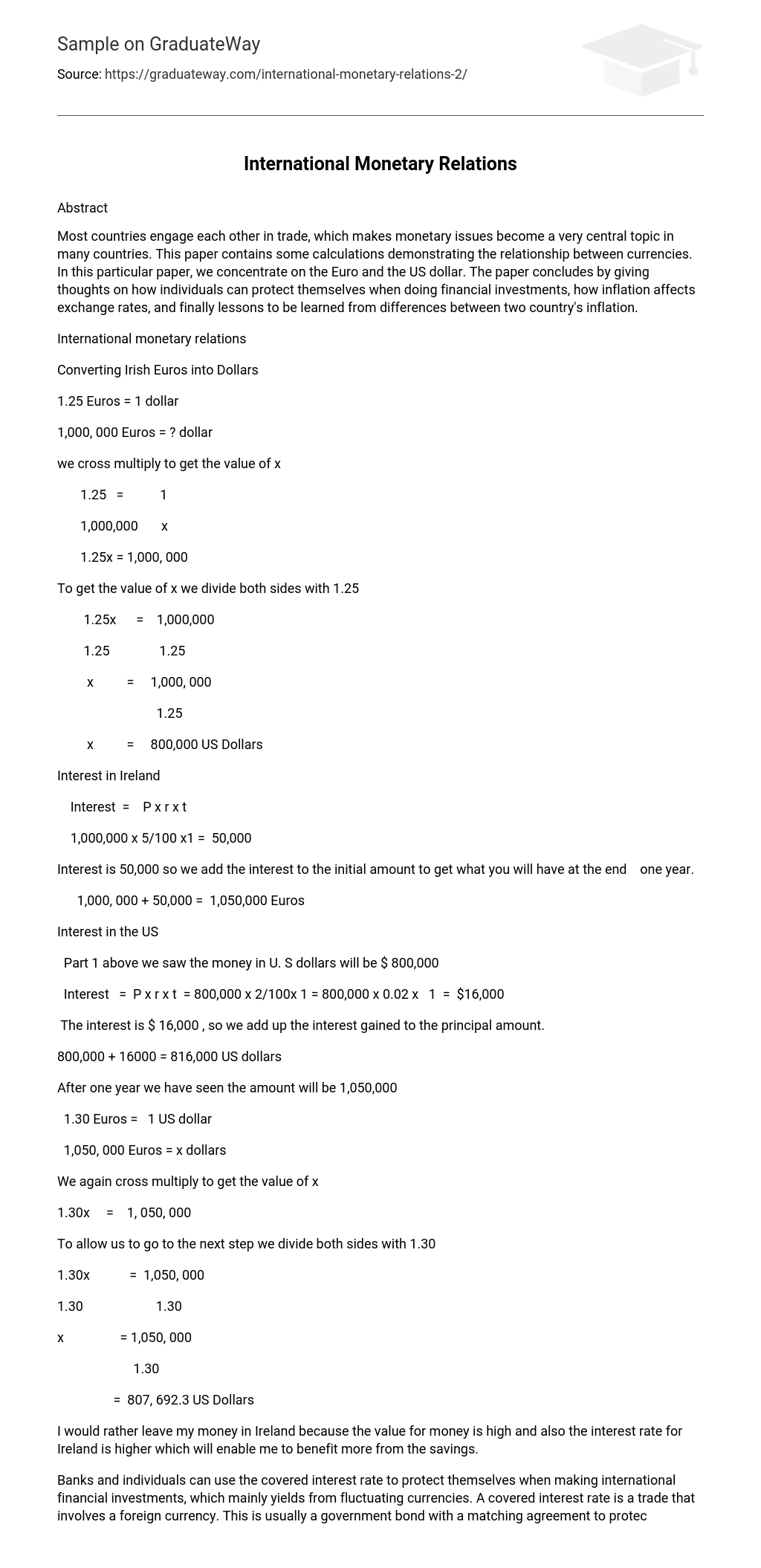Abstract
Most countries engage each other in trade, which makes monetary issues become a very central topic in many countries. This paper contains some calculations demonstrating the relationship between currencies. In this particular paper, we concentrate on the Euro and the US dollar. The paper concludes by giving thoughts on how individuals can protect themselves when doing financial investments, how inflation affects exchange rates, and finally lessons to be learned from differences between two country’s inflation.
International monetary relations
Converting Irish Euros into Dollars
1.25 Euros = 1 dollar
1,000, 000 Euros = ? dollar
we cross multiply to get the value of x
1.25 = 1
1,000,000 x
1.25x = 1,000, 000
To get the value of x we divide both sides with 1.25
1.25x = 1,000,000
1.25 1.25
x = 1,000, 000
1.25
x = 800,000 US Dollars
Interest in Ireland
Interest = P x r x t
1,000,000 x 5/100 x1 = 50,000
Interest is 50,000 so we add the interest to the initial amount to get what you will have at the end one year.
1,000, 000 + 50,000 = 1,050,000 Euros
Interest in the US
Part 1 above we saw the money in U. S dollars will be $ 800,000
Interest = P x r x t = 800,000 x 2/100x 1 = 800,000 x 0.02 x 1 = $16,000
The interest is $ 16,000 , so we add up the interest gained to the principal amount.
800,000 + 16000 = 816,000 US dollars
After one year we have seen the amount will be 1,050,000
1.30 Euros = 1 US dollar
1,050, 000 Euros = x dollars
We again cross multiply to get the value of x
1.30x = 1, 050, 000
To allow us to go to the next step we divide both sides with 1.30
1.30x = 1,050, 000
1.30 1.30
x = 1,050, 000
1.30
= 807, 692.3 US Dollars
I would rather leave my money in Ireland because the value for money is high and also the interest rate for Ireland is higher which will enable me to benefit more from the savings.
Banks and individuals can use the covered interest rate to protect themselves when making international financial investments, which mainly yields from fluctuating currencies. A covered interest rate is a trade that involves a foreign currency. This is usually a government bond with a matching agreement to protect themselves against currency risk. This trade takes advantage of inconsistencies of interests to make a risk free profit.
Inflation has a major effect on exchange rates, when there is inflation in a country, there will be a tendency to have weak currencies. When a country experiences inflation its currency will lose against other currencies.
What I infer from these differences is that inflation has an effect on the interest rate Ireland interests seems to be higher than those of the U.S. This is due to the fact that its inflation rate is higher than that of the US. The interest rate for Ireland is Five percent while those for the US are two percent. In the first instance, the Euro has a higher value but due to prolonged inflation, it loses the value to the U. S dollar.
References
- Robin Hahn el (1999) Everything you need to know about the global economy, Massachusetts: South End Press.
- Halifax Initiative(December 1996)., “Control Options for International Currency Speculation”
- Mahbub ul Haq, Inge Kaul, and Isabelle Grunberg (1996), The Tobin Tax: Coping with Financial Volatility eds. New York, London: Oxford University Press.





